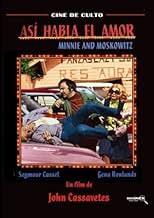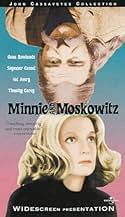AVALIAÇÃO DA IMDb
7,2/10
5,7 mil
SUA AVALIAÇÃO
Um curador de museu se apaixona por um manobrista maluco.Um curador de museu se apaixona por um manobrista maluco.Um curador de museu se apaixona por um manobrista maluco.
- Prêmios
- 2 indicações no total
Timothy Carey
- Morgan Morgan
- (as Tim Carey)
Darren Patrick Moloney
- Jim's Son
- (as Darren Moloney)
Alpha Blair
- Girl at Bar
- (não creditado)
Bruce Brown
- Husband
- (não creditado)
John Cassavetes
- Jim
- (não creditado)
Avaliações em destaque
This is the only film I have ever walked out on. The extreme senseless violence, lack of energy, dim cinematography and inane characters combine to take boring to new heights. Blech. If someone could tell me why this film was so widely regarded, I'd appreciate it.
Zelmo says "people that listen continuously are much more interesting than people that talk continuously" He doesn't get the girl. Seymour says "I think about you so much I forget to go to the bathroom." He gets the girl. "When I'm with someone I want to get away." This is the girl speaking. Her name is Minnie . She also says "I don't like men. They smile too much. You see a lot of teeth." This is no ordinary love story. Correction this is an extraordinary love story where Minnie ultimately becomes a Moskowitz which is difficult to say with a straight face. But the ultimate romance is between John Cassavetes and the English language. Forget the popcorn, to eternally enjoy Minnie &Moskowitz, have a notepad and some shorthand and "if you have bread, we can make toast."
I feel as though I know these people and have known people similar to them. These days, though, people are discouraged from showing such passion about anything especially love and loneliness. It has a slow beginning, but then look out! If you love romantic comedies, but would like to see one that had some basis in reality for a change {or at least did have back in the 70's}, then you should see this movie!
This light-heated (for Cassavetes)love story is pleasantly conveyed by two wonderful performances by Gena Rowlands and Seymour Cassell. Rowlands was never more beautiful as a repressed, damaged mid-30's woman who meets her match in Seymour. Cassell is a powderkeg of energy and romantic notions (on his terms).
There is a great supporting performance by Val Avery as Zelmo Swift and an unusual (as always) Timothy Carey that's worth the price of admission. Made between Husbands and A Woman Under the Influence this is Cass' most accessible film that should touch the heart of anyone (especially the Cassavetes haters) who claim his films are too long and ponderously heavy at times. Made my Top Ten that year and not seen by enough people. An 8 out of 10.
There is a great supporting performance by Val Avery as Zelmo Swift and an unusual (as always) Timothy Carey that's worth the price of admission. Made between Husbands and A Woman Under the Influence this is Cass' most accessible film that should touch the heart of anyone (especially the Cassavetes haters) who claim his films are too long and ponderously heavy at times. Made my Top Ten that year and not seen by enough people. An 8 out of 10.
Step the third in my journey through Cassavetes..
Here, he takes one of the most popular movie formats, the romance. Boy- meets-girl in LA, under the lights. But she is no cool femme fatale, she is fragile, unsure of herself. He is no Bogie himself; as the film starts he is watching The Maltese Falcon in a theater, a scene where Mary Astor throws herself crying on Bogie's feet. Trying to pick up women afterwards, he's chased out of bars, looked at as a weirdo and beaten up in an alley.
The idea is that we are not going to see movie people, but real people on the street. That was the ambition anyway, a situation aggravated by Cassavetes' actorly Studio background—as in Husbands, we have constant shouting matches, awkward intrusions, obnoxious pulling and nervousness. He seems to think the room inhabited by these characters won't feel real and lived, unless we have damage on the walls, a Greek sensibility, after all the main story recasts Zorba.
So unlike a Bogart film, the actors here don't coolly glide off each other, they cut themselves on each other's edges.
The same situation develops here as I described in my comment on Husbands. The edges, the damage are unusually pronounced, by this I mean a situation like when Moskowitz almost runs her over with his truck to get her to go with him takes me out of it. A softer next moment will pull me in again, until the next hysteric one and so on.
Which brings me to my main discussion about presence.
Moskowitz is the kind of character who can be likable once you get to know him, the sort of bond you form with coworkers that greatly depends on shared time. Minnie is warm when we first see her, but there's a haughty, nervous ghost in her. It is, let's say, a truer to life perception than the immediately charming Bogarts and Stanwycks of old. It requires work to take them in, giving space.
That narrative room, that space where characters wreck themselves and things works the same way once you excise the shouty moments, simply wonderful. None of the individual visual moments are cool or typically beautiful. The locales are drab and mundane. The light and textures all natural, the whole is imperfect but breathes. In this, he equals Pasolini, another master of the living eye.
So on a moment-by- moment basis, the space is like the characters, intensely present flow to undefined horizon. In a movie like the Maltese Falcon, the narrative horizon is immediately defined (get the bird), and again defined in every scene (get out of there, rough someone up, etc.) so we are at all times comfortably tethered, enjoying the play. What Cassavetes does matters in the long run in the sculpting of the overall effect, it doesn't leap to attention.
Like Husbands, this slowly starts to work for me once I have a narrative shift that faintly, very faintly defines a certain horizon in the story—here marriage. Cassavetes is work, because this happens so late in the movie, the bulk of it is like staring at a blank page waiting for inspiration, or waiting for musicians to tune their instruments. Here, that shift happens about 9/10ths in the film, and then we're through that and a new horizon opens, the closing shots of family life and then it's over.
So it starts to work late but extends for me to long after it's over, it's one of the most haunting effects I know, transcendentally marvelous; more on that in the next comment on Woman.
Here, he takes one of the most popular movie formats, the romance. Boy- meets-girl in LA, under the lights. But she is no cool femme fatale, she is fragile, unsure of herself. He is no Bogie himself; as the film starts he is watching The Maltese Falcon in a theater, a scene where Mary Astor throws herself crying on Bogie's feet. Trying to pick up women afterwards, he's chased out of bars, looked at as a weirdo and beaten up in an alley.
The idea is that we are not going to see movie people, but real people on the street. That was the ambition anyway, a situation aggravated by Cassavetes' actorly Studio background—as in Husbands, we have constant shouting matches, awkward intrusions, obnoxious pulling and nervousness. He seems to think the room inhabited by these characters won't feel real and lived, unless we have damage on the walls, a Greek sensibility, after all the main story recasts Zorba.
So unlike a Bogart film, the actors here don't coolly glide off each other, they cut themselves on each other's edges.
The same situation develops here as I described in my comment on Husbands. The edges, the damage are unusually pronounced, by this I mean a situation like when Moskowitz almost runs her over with his truck to get her to go with him takes me out of it. A softer next moment will pull me in again, until the next hysteric one and so on.
Which brings me to my main discussion about presence.
Moskowitz is the kind of character who can be likable once you get to know him, the sort of bond you form with coworkers that greatly depends on shared time. Minnie is warm when we first see her, but there's a haughty, nervous ghost in her. It is, let's say, a truer to life perception than the immediately charming Bogarts and Stanwycks of old. It requires work to take them in, giving space.
That narrative room, that space where characters wreck themselves and things works the same way once you excise the shouty moments, simply wonderful. None of the individual visual moments are cool or typically beautiful. The locales are drab and mundane. The light and textures all natural, the whole is imperfect but breathes. In this, he equals Pasolini, another master of the living eye.
So on a moment-by- moment basis, the space is like the characters, intensely present flow to undefined horizon. In a movie like the Maltese Falcon, the narrative horizon is immediately defined (get the bird), and again defined in every scene (get out of there, rough someone up, etc.) so we are at all times comfortably tethered, enjoying the play. What Cassavetes does matters in the long run in the sculpting of the overall effect, it doesn't leap to attention.
Like Husbands, this slowly starts to work for me once I have a narrative shift that faintly, very faintly defines a certain horizon in the story—here marriage. Cassavetes is work, because this happens so late in the movie, the bulk of it is like staring at a blank page waiting for inspiration, or waiting for musicians to tune their instruments. Here, that shift happens about 9/10ths in the film, and then we're through that and a new horizon opens, the closing shots of family life and then it's over.
So it starts to work late but extends for me to long after it's over, it's one of the most haunting effects I know, transcendentally marvelous; more on that in the next comment on Woman.
Você sabia?
- CuriosidadesJohn Cassavetes directs his wife Gena Rowlands, his mother Katherine Cassavetes, his brother-in-law David Rowlands, his mother-in-law Lady Rowlands and his children Xan Cassavetes and Zoe R. Cassavetes.
- Erros de gravaçãoWhen Moskowitz is carrying Minnie in the living room, she has a lit cigarette in her hand. After he carries her upstairs to her bedroom and puts her down on the bed, she has no cigarette in her hand.
- Citações
Seymour Moskowitz: If you think of yourself as funny, you become tragic.
- ConexõesFeatured in Edge of Outside (2006)
Principais escolhas
Faça login para avaliar e ver a lista de recomendações personalizadas
- How long is Minnie and Moskowitz?Fornecido pela Alexa
Detalhes
- Data de lançamento
- País de origem
- Idioma
- Também conhecido como
- Assim Fala o Amor
- Locações de filme
- Los Angeles County Museum of Art - 5905 Wilshire Blvd., Hancock Park, Los Angeles, Califórnia, EUA(Moskowitz drops Minnie off in front of the museum plus interior shots)
- Empresas de produção
- Consulte mais créditos da empresa na IMDbPro
Bilheteria
- Orçamento
- US$ 900.000 (estimativa)
- Faturamento bruto mundial
- US$ 2.296
- Tempo de duração
- 1 h 54 min(114 min)
- Proporção
- 1.85 : 1
Contribua para esta página
Sugerir uma alteração ou adicionar conteúdo ausente





























